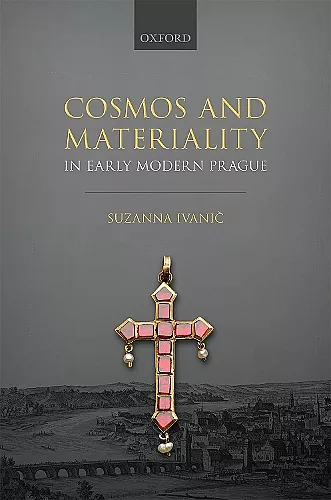Cosmos and Materiality in Early Modern Prague
Format:Hardback
Publisher:Oxford University Press
Published:24th Jun '21
Should be back in stock very soon

Prague in the seventeenth century is known as home to a scintillating imperial court crammed with exotic goods, scientists, and artisans, receiving ambassadors from Persia, and also as a city suffering plagues, riots, and devastating military attacks. But Prague was also the setting for a complex and shifting spiritual world. At the beginning of the century it was a multiconfessional city, but by 1700 it represented one of the most archetypical Catholic cities in Europe. Through a material approach, Cosmos and Materiality pieces together how early modern men and women experienced this transformation on a daily basis. Cosmos and Materiality in Early Modern Prague presents a bold alternative understanding of the history of early modern religion in Central Europe. The history of religion in the early modern period has overwhelmingly been analysed through a confessional lens, but this book shows how Prague's spiritual worlds were embedded in their natural environment and social relations as much if not more than in confessional identity in the seventeenth century. While texts in this period trace emerging discourses around notions of religion, superstition, magic, and what it was to be Catholic or Protestant, a material approach avoids these category mistakes being applied to everyday practice. It is through a rich seam of material evidence in Prague - spoons, glass beakers, and amulets as much as traditional devotional objects like rosaries and garnet encrusted crucifixes - that everyday beliefs, practices, and identities can be recovered.
Ivanic's monograph is an important and revitalizing contribution to the study of material culture in early modern (East) Central Europe. After a long period of scepticism in 1he scholarship of the post linguistic turn towards supposedly less narrative and more object orientcd historical sources, such as inventories, lists and catalogues, Suzanna Ivanic succeeds in rehabilitating the study of this underestimated archival material. Moreover, she situates that material within cutting edge academic discussions and reveals inspiring ways to explore the sources against the grain, raising valuable new questions. * Veronika Capska, Acta Comeniana *
Divided into three parts, Cosmos and Materiality opens with an Introduction in which Ivanič lays out her concept, arguments, and the structure of the volume. A succinct synthesis of urban history is also presented. The rest of the book, six chapters, is divided into two parts. In Part I 'A Shared Cosmos', Ivanič starts with a chapter that analyzes the notions of sympathies, harmonies, and correspondences between the visible and invisible, the profane and the sacred. * R. Po-Chia Hsia, The Journal of the Social History Society *
Religious studies of seventeenth-century Prague can, too often, treat the city's rich and changing religious culture as homogenic, in which individuals took up the spiritual directives of their leaders as a matter of course. Ivanič's meticulous and absorbing study of the personal possessions of a range of Prague's Burghers across the century confronts, complicates and ultimately dismantles this narrative. * Eleanor Janega, Department of International History, The London School of Economics, SEER *
A lively study * Joseph Davis, Journal of Early Modern History *
- Winner of Winner, 2022 Biennial Book Prize, Society for Renaissance Studies Honorable Mention, 2022 BASEES Womens Forum Prizes.
ISBN: 9780192898982
Dimensions: 240mm x 165mm x 23mm
Weight: 540g
256 pages